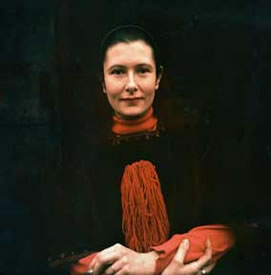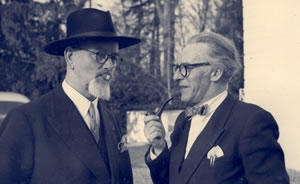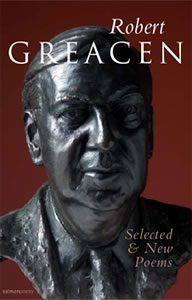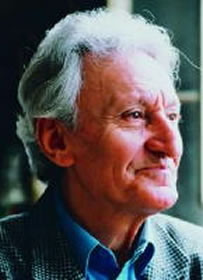|
De Engels - Amerikaanse dichteres Denise Levertov werd geboren op 24 oktober 1923 in Ilford, Essex. Zie ook mijn blog van 24 oktober 2008 en ook mijn blog van 24 oktober 2009 en ook mijn blog van 24 oktober 2010xml:namespace prefix = o ns = "urn:schemas-microsoft-com:office:office" />
A Map Of The Western Part Of The County Of Essex In England
Something forgotten for twenty years: though my fathers
and mothers came from Cordova and Vitepsk and Caernarvon,
and though I am a citizen of the United States and less a
stranger here than anywhere else, perhaps,
I am Essex-born:
Cranbrook Wash called me into its dark tunnel,
the little streams of Valentines heard my resolves,
Roding held my head above water when I thought it was
drowning me; in Hainault only a haze of thin trees
stood between the red doubledecker buses and the boar-hunt,
the spirit of merciful Phillipa glimmered there.
Pergo Park knew me, and Clavering, and Havering-atte-Bower,
Stanford Rivers lost me in osier beds, Stapleford Abbots
sent me safe home on the dark road after Simeon-quiet evensong,
Wanstead drew me over and over into its basic poetry,
in its serpentine lake I saw bass-viols among the golden dead leaves,
through its trees the ghost of a great house. In
Ilford High Road I saw the multitudes passing pale under the
light of flaring sundown, seven kings
in somber starry robes gathered at Seven Kings
the place of law
where my birth and marriage are recorded
and the death of my father. Woodford Wells
where an old house was called The Naked Beauty (a white
statue forlorn in its garden)
saw the meeting and parting of two sisters,
(forgotten? and further away
the hill before Thaxted? where peace befell us? not once
but many times?).
All the Ivans dreaming of their villages
all the Marias dreaming of their walled cities,
picking up fragments of New World slowly,
not knowing how to put them together nor how to join
image with image, now I know how it was with you, an old map
made long before I was born shows ancient
rights of way where I walked when I was ten burning with desire
for the world's great splendors, a child who traced voyages
indelibly all over the atlas, who now in a far country
remembers the first river, the first
field, bricks and lumber dumped in it ready for building,
that new smell, and remembers
the walls of the garden, the first light.

Denise Levertov (24 oktober 1923 20 december 1997)
De Vlaamse auteur Ernest Claes werd geboren op 24 oktober 1885 te Zichem. Zie ook mijn blog van 24 oktober 2010 en eveneens alle tags voor Ernest Claes op dit blog.
Uit: De Witte
Juist toen de Witte binnentrad kwam er boven in den ronden kop waar 't leven zat, onzichtbaar, een roezig ronken dat aanhield tot er acht helder metalen klanken uitsprongen, en dan begon weer het eenelijk effen tiktakken zonder verpoozen. Op de witglimmende wijzerplaat stak de kleine wijzer in 't volle zwart van de romeinsche acht, en de groote hing lamlullig naar de één gezakt, of 't hem verder niet meer aanging en hij 't zijne gedaan had.
De Witte keek naar de klok en mommelde: Ziede wel dat et nog gien acht ure was, en dan zette hij zich aan tafel. Naast den koffiepot lagen drie boterhammen voor hem gereed gesneden. Hij schonk een tas koffie in, keek eens door de openstaande achterdeur den hof in of moeder niet afkwam - en haalde uit den suikerpot in de schapraai drie klontjes broodsuiker. Bedaard begon hij dan zijn boterhammen op te eten, zonder een kruiske te maken nu hem toch niemand zag. Hij lipte telkens proevend aan zijn koffie, en sloeg naar de vliegen die over heel de tafel, in gaatjes en spleetjes, aan broodkruimels en nattigbruine koffievlekken te peuteren zaten.
De drie boterhammen waren spoedig verorberd; hij sneed er nog een van 't brood, en toen die op was ging een halve, die van 's morgens was blijven liggen, ook nog achterna.
De Witte was slecht geluimd, zeer slecht geluimd. Eerst dat droomen, waar niets van aan was, dan de musch die wel nergens zou te vinden zijn, moeder met haar gewoon gezeur van elken morgen, te weinig boterhammen, die vuile koffietafel op den hoop toe, - als ze misschien dachten dat hij dien smerigen boel zou opruimen!... neê, hij kon het even goed laten staan!
Hoe de Witte er uit ziet? - Om met zijn kop te beginnen: sprietel-wit haar, verkenshaar noemde hem de meester somtijds, om bij wijze van verkorting den heelen Witte te beduiden. Een laag voorhoofd, kleine bruine oogskens die overal te gelijk rondspiedden, een mager gezicht, groote wijd uitstaande ooren, een mond die tamelijk breed mocht genoemd worden, - iets wat Heinke, zijn oudsten broer, eens had doen zeggen: Oan onze Witte ze bakkes es 't goed te zien dat èm beter kan frèten as werke. De Witte had dit als een beleediging opgenomen om den toon waarop het gezegd werd, maar beschouwde het overigens als iets zeer natuurlijks, zelfs zonder dat bakkes. - Ferme schouders had de Witte, een kloeke borst, stevige armen en beenen, die door frak en broek aan ellebogen en knieën heenwrongen, omdat die deelen het meest van zijn dagelijksche lichaamsoefeningen te verduren hadden.

Ernest Claes (24 oktober 1885 - 2 september 1968)
Hier met de schrijver Jan Vercammen (rechts)
De Ierse dichter en essayist Robert Greacen werd geboren op 24 oktober 1920 in Derry. Zie ook mijn blog van 24 oktober 2008 en ook mijn blog van 24 oktober 2010
At Brendan Behan's Desk
Full seven years I've sat
And scribbled at this desk:
Cards, letters, poems, autosnaps,
Diary entries, shopping lists,
While Beatrice down below hoarded
Memories of Brendan in a clutter
Of paintings, posters, photos,
With, for company, two dogs.
To Brendan's ghost I must confess
My orderly grey days.
At moments I'd like to be out
Emptying glasses in the pubs
Of Dublin town, blarneying
To actors, poets, drunks,
Then taxi-ing back to Cuig*
Not earlier than three a.m.,
Rousing the solid citizens,
Telling an uncaring world
How 'that old triangle
Went jingle-jangle
Along the banks of the Royal Canal.'
Instead, I sit at Brendan's desk,
Reading, scribbling, drinking coffee-
A Protestant without a horse

Robert Greacen (24 oktober 1920 13 april 2008)
De Bulgaarse schrijver Yordan Radichkov werd geboren op 24 oktober 1929 in het dorp Kalimanitza, in de provincie Montana. Zie ook mijn blog van 24 oktober 2010
Uit: The Bowler-Hat
Progressive and civilized countries opposed to the bowler-hat, the top hat made desperate attempts to stay and although its resistance it confined itself to the sphere of diplomacy. When they shot the Serbian king in the cab, the bowler-hat first hid the fear on the monarchs face, because the face of a king must be smiling, or manly, or noble, but never - frightened. The Bowler-hat spread gradually in Europe, threw into Danube Wallachian and Magyar felt hats, supplanted on North the perky Tyrol hat and made its way even into the British island, as it captured there the Englishmen to their great surprise. British people continued to smoke pipes at the fireplaces and to read Dickens and they accepted the bowler-hat with the smile of Mona Lisa, began to take it for a drive with their famous Rolls-Roices and they accepted the fact that with the same smile they also proved that Britain is a parliamentary state.
A, exactly at that time, when the one half of the Earth was under the shadow of the bowler-hat, and the other half was under the shadow of the iron soldier helmet, our Bulgarian bought The Bowler-hat in question from Italy, before he started on a journey to his homeland.

Yordan Radichkov (24 oktober 1929 - 21 januari 2004)
|



